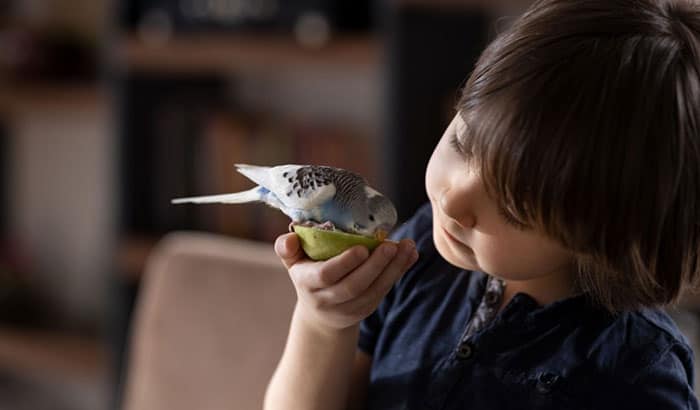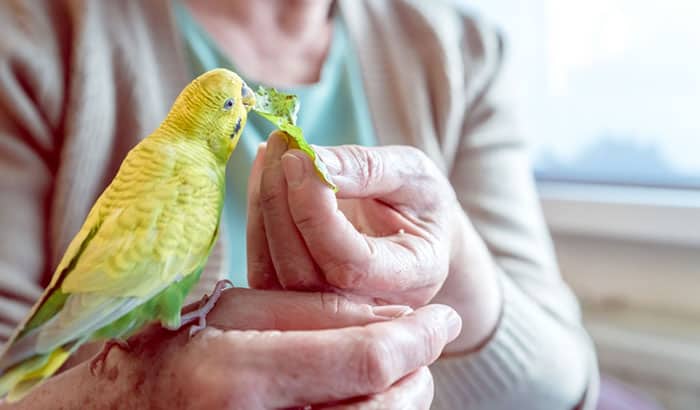Congratulations for bringing home your pet bird! While a bird may be a great companion, you need to establish a relationship with your pet to enjoy its companionship.
The first thing you need to work on is gaining the trust of your pet bird. It will be hard during the first few days as the bird will still be getting used to you and to its new environment. Thus, you need to be patient.
Keep it Slow But Consistent
Birds need to adjust to their new environments. Whether they are directly from the wild or they came from a pet store, they need to adjust to their new home. Thus, the bird may not be as responsive as you want it to. Do not force interaction with your bird. When the bird is ready to interact with you, it will initiate the interaction.
Take baby steps to make your bird feel at home. Let it get used to its space in the house before you start moving it around the house. As the days go by, start letting it stay in other places in the house. You can accompany it in the living room while watching the evening news.
You can also let it stay with you out in the porch as you read the paper and sip your coffee in the morning. Build a habit. Moving the bird around the house should be like walking a dog.
Observe and Take Note of Your Bird’s Behaviors and Body Language
Birds communicate through their body language. Watch how your bird behaves when you are around. If it keeps moving away, do not keep approaching it. Let it get used to your presence before you start approaching it again.
Take note of how the bird acts when it is uncomfortable, irritated, or agitated. You also need to take note as to how your bird opens its beaks, spreads its wings, or shakes its body.
On another note, you need to really pay attention to its behavior when it is uncomfortable. Once it starts showing signs of discomfort, you need to give it space. Let the bird take a break and let it enjoy alone time.
Feed the Bird
Feeding the bird may be another avenue for you and your bird to bond. While your bird may not be immediately comfortable with eating from your hand, there is no harm in trying. As soon as the bird does not move away when you approach it, start feeding your bird from your hand. When feeding, keep in mind that biting is an aggressive behavior. Once the bird starts biting, you need to stop feeding. You need to be patient and kind.
You also have to be careful with what you feed your pet. There will be instances that your bird may be picky with food. You need to have patience and keep learning about what your bird really wants.
When you are eating with your bird, make sure that your food is safe for bird consumption. You have to keep in mind that chocolates and salt are a definite hazard to birds. Make sure that when they are present in your food, never feed it to your bird.
Bond with Your Bird Through doing Things Together
Watch movies that have birds in it. You can also watch animal planet. Another option could be reading stories to your bird. You can also sing to it or play music for it. If possible, use endearments along with the bird’s name when talking to it.
Always talk soothingly to your bird. Furthermore, you can also do non-recreational activities with your bird. If you work at home, you can always keep the bird beside you while you work. Furthermore, sharing meals with your pet will also strengthen your bond.
When you are not busy, try taking the bird out of the cage and playing with it.
Creating a Reward System for Your Bird
Appreciation is also recognized and loved by pets. It is but proper to create a reward system for your bird. Aside from petting the bird or saying praises, you can do something out of the ordinary.
For instance, when the bird no longer moves away from you when you approach it, reward it with some treats. When the bird starts moving to your hand, reward it with some tasty treats. You can also reward your bird with toys instead of treats.
While for every reward system may have punishments for misbehaviors, it does not work with birds. Punishments may cost you your bird’s trust. Shouting, throwing things and hitting your bird are useless. Birds only recognize such actions as hostile. Showing hostile behavior towards your bird may lead to a broken relationship with your pet.
Create a List of Your Bird’s Likes and Dislikes
What better way to gain a bird’s trust than to pay attention to its likes and dislikes? Pay attention to your bird. Listing down your bird’s favorite food, activities and toys may help you in the future. On the other hand, listing down your bird’s dislikes will let you know what things you need to avoid. Staying on the good side of your bird ensures you gaining your bird’s trust.
Bonding Through Grooming
Aside from petting, eating together and enjoying leisure time, you may also earn your bird’s trust through grooming. If the bird is comfortable with it, you can try scratching the bird’s back with care. You can also try removing broken blood feathers.
Always remember to be gentle. As your relationship progresses, you can share showers with your bird. Let the bird perch on a shower curtain holder while you bathe. This will allow the bird to trust you more.
Final Thoughts
Getting a bird to trust you requires a lot of patience and hard work. It is best if you put in time and effort.



This information is very helpful and I think I have followed a majority of them. I have had lots of budgies over the years and i’ve managed to train them all except one to trust me. They would follow me from room to room even going into the kitchen sink whilst the water was running to bathe.
I absolutely love them. I haven’t had one for a few years now because it’s difficult to find someone to care for them when I’m away in the way I would like, and they become sick on my return and sadly die. I am now in my 70s and i am thinking of getting another one from a local breeder.